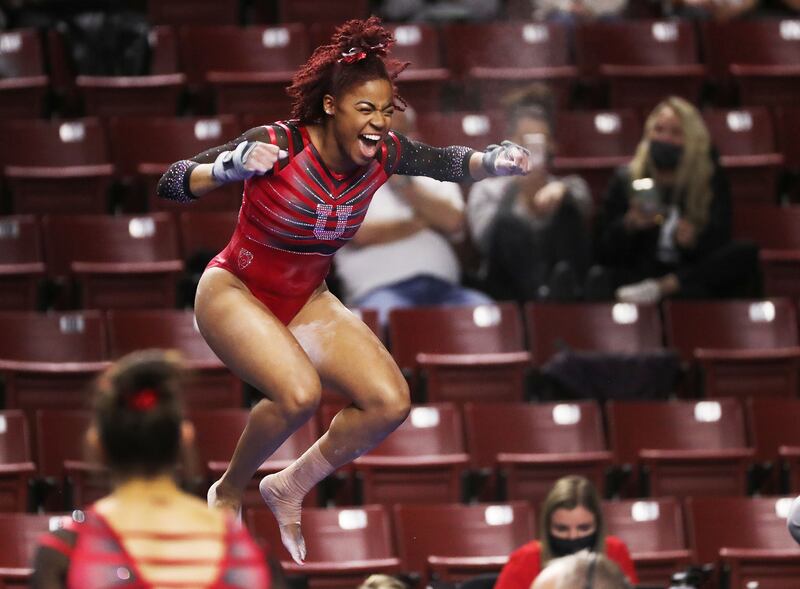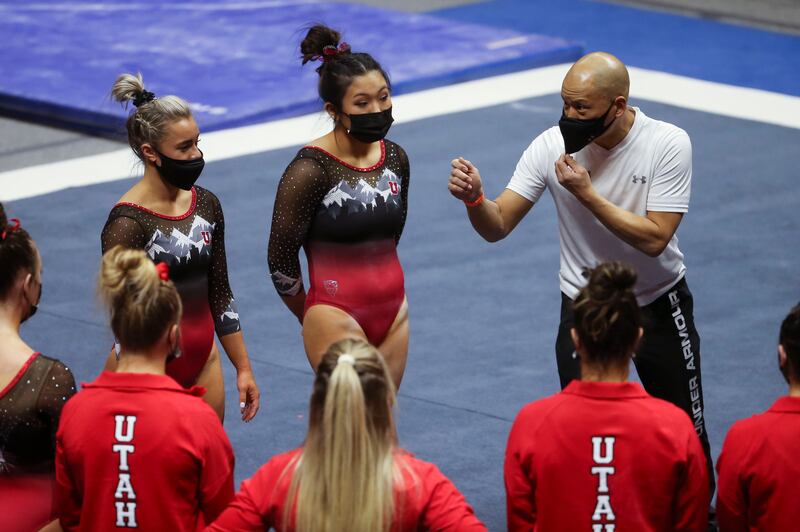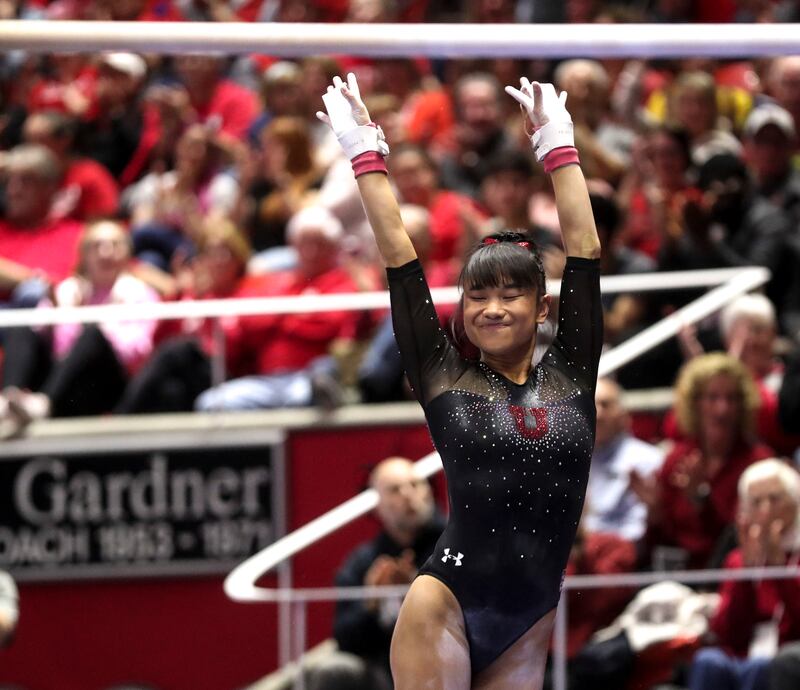When the 2020-21 NCAA women’s gymnastics championships kick off Friday morning in Fort Worth, Texas, more than a few noteworthy competitors will be people of color.
When healthy, Florida’s Trinity Thomas is inarguably the best gymnast competing at the collegiate level. Denver’s Lynnzee Brown triggered the rise of the Pioneers’ program and will be competing for the all-around title. Michigan’s Sierra Brooks, LSU’s Haleigh Bryant, Minnesota’s Mya Hooten, Alabama’s Luisa Blanco, Utah’s Cristal Isa and Cal’s Kyana George each are vital contributors on title-contending teams. And who can forget UCLA’s Chae Campbell and Nia Dennis, both of whom have had performances on floor go viral on social media this year.
Isa, an Asian American, being included in that group shouldn’t be a surprise, but might be. For years, Utah’s program has had the reputation of being white. Not exclusively, but almost, at least in online discourse about the team.
“A lot of people, especially the Gymternet, would make comments about Utah,” former Red Rock Kim Tessen, an Asian American herself, said. “They’d say things like ‘Utah’s team is so white.’”
That reputation wasn’t always deserved, and especially isn’t this season. Of the 13 gymnasts who comprise Utah’s team, four are people of color: Cammy Hall, Isa, Jaedyn Rucker and Alani Sabado.
Throw in the fact that Utah head coach Tom Farden is a racial minority himself, the only racial minority currently leading an upper-echelon gymnastics program, and it can be said that diversity has come to Utah, or at least up onto the Hill.
‘I was very reluctant to come’

Hall, Isa, Rucker and Sabado have all been key contributors for the Red Rocks this season. Isa is an All-American who has regularly competed in the all-around, while Hall and Rucker each earned Pac-12 honorable mention honors for their work on vault and floor exercise. And as a freshman who enrolled a year early, Sabado has been in the uneven bars lineup from Day 1.
But given the reputation Utah’s program has had when it comes to diversity, not to mention the state’s general demographic — as of 2019, 90.6% of Utahns were white — almost all were initially reluctant to bring their talents to Salt Lake City.
Before switching her commitment to Utah, Isa was originally pledged to Arizona. A close relationship with then-Wildcats coach Tabitha Yim played a role in that commitment, but Isa and her father, Stan, were also searching for an environment where she would be comfortable.
From the outside, that did not appear to be Utah, even for a native of Henderson, Nevada. Henderson is a majority white community, but it has notable racial minority populations of Hispanics and Asians.
“I wouldn’t say there are a lot of Asians (in Henderson), but there are a lot Asians who do gymnastics,” Isa said. “I felt like that really opened the door and gave me people to connect with.”
A move to Salt Lake City was a concern for her, one shared by Rucker and Sabado.
Rucker, a native of Mesa, Arizona, describes herself as “mixed.”
“I am African American and white,” she said.
And while Mesa isn’t exactly a melting pot — 81.5% of residents are white — she, too, questioned a move to Salt Lake City, though she was focused more on the racial makeup of the team itself.
“Before I got here, I was kind of hesitant because there wasn’t very much diversity on the team,” Rucker said.
Sabado, a native of Temecula, California, who identifies as Asian American — “I’m Filipino, if someone were to ask me what my ethnicity is,” she said — had similar concerns, if even a little stronger than Rucker.
“I was very reluctant to come with it being not as diverse as it is back home,” Sabado said.
‘They treat us as their own’

Hall, who is Black and a native of Gainesville, Virginia, did not share the same concerns. Throughout her entire life in gymnastics, she’d been one of the only Black competitors, so the makeup of Utah’s roster, even the demographics of Utah itself were not unusual to her.
“Being a Black gymnast in general, there aren’t a lot of us in the sport to begin with,” Hall said. “It is a predominantly white sport. That is how I grew up, so I was used to it. It didn’t really bother me.”
So when Hall was being recruited, what convinced her to travel to Utah on an official visit was Farden’s belief in her abilities and her potential.
“He believed in me,” she said. “He thought I could do more than what I was doing and he needed someone on the team that could do that. He believed in me when I didn’t.”
Once in Utah, though, Hall was won over by the same people who would also win over Isa, Rucker and Sabado: the Red Rocks themselves.
“When I came here, everyone made me feel a part of the family and welcome,” Hall explained. “All of the girls have been real genuine since Day 1, and even all the faculty and the staff that we work with. They treat us as their own and do everything they can to support us and help us feel like family here. Nothing made me uncomfortable. That is one of the reasons I committed.”
Rucker, too, noticed it almost immediately. A welcoming environment in the gym and on campus itself.
“Everyone was super welcoming on the team and in the coaching staff, even in all my classes,” she said. “So it (being a racial minority) hasn’t been a problem for me at all.”
“Everyone has been accepting and welcoming,” added Sabado. “They just treat you for who you are and not for what you look like or your cultural background.”
It didn’t hurt Isa that Farden and then-Utah gymnasts Kari Lee, Tessen and Lauren Wong were Asian American, either.
“When I committed there were actually more Asians (on the team than now),” she said. “It was Tom, Kari, Kim and Lauren. So I was always surrounded by fellow Asians, and Tom assured me that I’d be comfortable and that there is a community in Salt Lake City.”
‘I can honestly tell them what it is like’

Farden being Asian American has been a boon to Utah’s program as it has grown more diverse. While neither Hall, Isa, Rucker nor Sabado believe Farden being Asian American to be the primary reason they chose to become Utah gymnasts, it was a reason, at least for some.
“Subconsciously I think that helped,” Isa said.
In large part because Farden has experienced what it is like to be a racial minority in Utah and can speak to it. In the specific cases of former Red Rocks Corrie Lothrop and Tessen, as well as future Red Rock Kara Eaker, his being an adopted Asian American carried even more weight.
“Personally, me being a person of color has helped attract people of color,” Farden said. “When someone asks what is it like being a minority in Utah or Salt Lake City, I can honestly tell them what it is like. I have Kara coming and I know her parents were comfortable because I am an adopted Asian and she is an adopted Asian. Kim was an adopted Asian. Corrie was an adopted Asian. We can talk about things because we know what it is like to be in an orphanage. Those are unique things.”
Farden’s experience in Utah has been enviable, as he tells it. Home is Holladay, a suburb of Salt Lake City, and Farden and his family couldn’t ask for a better one.
“I give it a 10,” Farden said. “Love it. Love it. My wife and I have lived there the whole time. Our neighborhood is incredible. We were welcomed right away. We have many friends in the community. I’ve never had anything said to me here, racist-wise or condescending or microaggressions. I can’t say that about everywhere I’ve been, but here has been nothing but wonderful. Our whole family has had a wonderful experience.”
Farden also believes his time at the U. has been the best of his career, and as he speaks it is easy to understand how he has fostered the reputation of being one of the best recruiters in the country.
“I have had an awesome experience here,” he said. “I’ve had the best coaching experience here of the three schools that I’ve been at. This has been by far my best experience as a person of color.”
Being a coach of color has always been a point of pride for Farden.
“I was really excited to be a coach as a person of color, a minority, because there weren’t very many minorities in coaching at all,” he said. “I looked at that as an opportunity because I could see that gymnastics encompassed all races and there were not very many people of color in leadership roles. I embraced that.
“If you look at the national team, you can see that diversity is improving and to have a diversity leader is nothing but a positive. I want to show other people of color that you can coach NCAA gymnastics, have an awesome life and career and I’ve already reached all of that.”
None of this is to say that Farden hasn’t experienced discrimination, but his personal ethos is to not let it affect him.
“As a minority you can take it one of two ways,” he said. “You can let it eat at you every day, let it bother you, or you can embrace your culture and history and just carry forward with your life.
“I think it is terrible that many have suffered that. I have suffered racism in my life. But I am not going to let it tear me down and prevent me from believing in humanity. That is just not going to happen.”
‘Gymnastics was definitely a refuge’

Farden isn’t the only racial minority associated with Utah gymnastics who has experienced racism, discrimination or microagressions in their life. All have at some point or another.
Lee, who competed for Utah from 2015 to 2019, remembers going to high school in Peoria, Arizona, and hearing regular snide comments about needing to be smarter than everyone else or excelling in subjects like math.
Similar to Lee, Tessen — who grew up in Orem and returned home after graduating from Utah — does not remember her time in middle school or high school fondly. Now, due to the pandemic and rising xenophobia toward Asians and Pacific Islanders, Tessen has once again become a target of racism. Recently, a pair of young teenage boys yelled “ching, chang, chong” at her while she was shopping.
“At first I was so shocked that I didn’t say anything,” she said. “It took me a second to realize what had happened and realize that that was totally not OK. I was just minding my own business and you have to go make fun of me. I can’t imagine what it is like for the people that are actually being physically attacked, being battered and assaulted because of what they look like while they are just trying to mind their own business and go about their lives.”
While neither Isa, Sabado, Lee nor Tessen have been subjected to any sort of physical violence themselves during the pandemic, they have feared for the safety of their family and friends.
“I haven’t been worried about it, but I’ve been worried about it for other Asians,” Isa said. “Especially since the brunt of it is in the Bay Area and that is where my family is from and I have a lot of friends from there, too. I just worry about it. In Asian culture, the elderly are the purest and so cute, and for people to be doing this is so sad.”
The University of Utah has been a safe place, though, at least inside the gymnastics program. The fanbase, which is robust, has never been anything but supportive.
“Our fans are super loving and supportive,” Lee said. “They are just huge fans of gymnastics in general. Rather than looking at the minorities of the team, I think they were just looking at our skills and what we bring to the table for the team, just our talent in gymnastics and us being role models.”
To that point, Isa remembers an instance ahead of her first Red Rocks Preview, back in 2018. The team was signing previews for fans when an Asian father approached her with his young daughter in tow.
“He told me, ‘I just wanted to say that it is really cool that my daughter has an Asian role model,’” Isa said. “I literally almost cried. I didn’t realize that I had some sort of impact on a younger Asian gymnast.”
Even as the Red Rocks were role models for up-and-coming gymnasts, the sport itself provided something just as important to them, a safe haven from race-based hate.
“Gymnastics was definitely a refuge for me,” Tessen said. “Most of the time growing up and even into my college years it was something that, even if I was trying to be comfortable with myself, my physical differences and physical flaws, gymnastics was something I was really proud of.”
And with the growing diversity at Utah, the Red Rocks program has become a place of safety for every gymnast.
“I can refer to this place as my second home,” Hall said. “People don’t single you out or anything and everyone is really welcoming and nice. That is one of the best parts of being on this team. I consider all these girls to be my sisters.”


